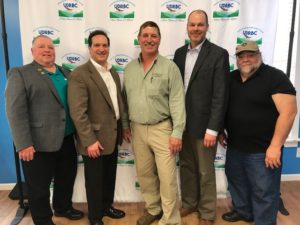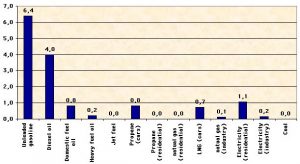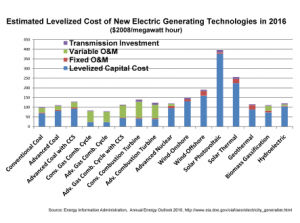Biden-Harris Administration Announces Nearly $1 Billion from EPA’s Clean School Bus Program for 389 School Districts
Historic investment from President Biden’s Bipartisan Infrastructure Law headed to all 50 states in effort to transform America’s school bus fleet
WASHINGTON (October 26, 2022) — Today, the Biden-Harris Administration announced the Fiscal Year 2022 recipients of the U.S. Environmental Protection Agency’s (EPA) Clean School Bus Program rebate competition, awarding nearly $1 billion from President Biden’s Bipartisan Infrastructure Law to 389 school districts spanning 50 states, Washington, DC, and several Tribes and U.S. territories. The grants will help school districts purchase over 2,400 clean school buses that will accelerate the transition to zero emission vehicles and produce cleaner air in and around schools and communities.
Vice President Kamala Harris and EPA Administrator Michael S. Regan will join schoolchildren, district leaders and community members in Seattle, Washington, later today to make the announcement and highlight how it will reduce greenhouse gas emissions, save schools money, and better protect children’s health. The investment will also drive demand for American-made batteries and vehicles, boost domestic manufacturing, and create good-paying jobs.
“President Biden’s historic Bipartisan Infrastructure Law is accelerating our nation’s transition to electric and low-emission school buses while ensuring a brighter, healthier future for our children,” said EPA Administrator Michael S. Regan. “As many as 25 million children rely on the bus to get to school each day. Thanks to the Biden-Harris Administration, we are making an unprecedented investment in our children’s health, especially those in communities overburdened by air pollution. This is just the beginning of our work to build a healthier future, reduce climate pollution, and ensure the clean, breathable air that all our children deserve.”
In May, EPA announced the availability of $500 million for its Clean School Bus Program. Given overwhelming demand from school districts across the country, including in low-income communities, Tribal nations, and territories, EPA nearly doubled the amount of funding that will be awarded to $965 million. The rebate application period closed in August with an outstanding response from school districts seeking to purchase electric and low-emission school buses across the country.
At this time, through a lottery system, the agency has selected 389 applications totaling $913 million to support the purchase of 2,463 buses, 95% of which will be electric. EPA will distribute awards to school districts in all 50 states and Washington D.C., along with several federally recognized Tribes and U.S. territories. School districts identified as priority areas serving low-income, rural, and, or Tribal students make up 99% of the projects that were selected. More applications are under review, and the agency plans to select more to reach the full $965 million in the coming weeks.
Those school districts who received an award can now proceed with purchasing new buses and eligible infrastructure. Selectees will need to submit Payment Request Forms with purchase orders demonstrating they have ordered new buses and eligible infrastructure. EPA is also partnering with the U.S. Department of Energy and Department of Transportation to provide school districts with robust technical assistance to ensure effective implementation.
These awards are the first $1 billion of a five-year, $5 billion program created by President Biden’s Bipartisan Infrastructure Law. EPA is also designing the next rounds of program funding to launch in the coming months, which will include an ambitious grant competition. Through future rounds of funding, EPA will make available another $1 billion for clean school buses in Fiscal Year 2023. EPA encourages school districts not selected in the first round of rebates – and those that did not apply this funding cycle – to participate in future rounds.
About the Clean School Bus Rebate Program
The Clean School Bus Program will reduce greenhouse gas emissions, save money for school districts and produce cleaner air. Diesel air pollution is linked to asthma and other conditions that harm students’ health and cause them to miss school, particularly in communities of color and Tribal communities. Phasing out these diesel engines will ensure cleaner air for students, bus drivers, and school staff working near the bus loading areas, and the communities through which the buses drive each day. The reduction in greenhouse gas emissions from these bus replacements will also help to address the outsized role of the transportation sector in fueling the climate crisis. The program will also save school districts money as they upgrade school bus fleets, replacing older, heavily polluting buses with brand new clean school buses, while freeing up needed resources for schools.
The 2022 Clean School Bus Rebates prioritize low-income, rural, and Tribal communities. The vast majority of applicants met the priority definition under the 2022 Clean School Bus Rebates criteria, resulting in access to more funds for buses and electric vehicle infrastructure for schools in areas that need them the most. The program also delivers on President Biden’s Justice40 Initiative, which aims to deliver 40% of the overall benefits of certain federal investments to disadvantaged communities that are marginalized, underserved and overburdened by pollution.
“What kinds of investments fall within the Justice40 Initiative? The categories of investment are: climate change, clean energy and energy efficiency, clean transit, affordable and sustainable housing, training and workforce development, remediation and reduction of legacy pollution, and the development of critical clean water and wastewater infrastructure.”
View the full list of Clean School Bus award recipients here.
Question? Does under-served communities include the communities where the local school district has failed to teach the kids how to read, write, do basic math, and know the history of the country??
Training Courses
Redvector – As part of our education efforts and because of our professional background at KnowYourH20, we have partnered with Red Vector (through the BF Environmental affiliate portal) to facilitate online training courses for individuals, licensed professionals, facility managers, construction, and citizen scientists.
pDH ENgineer -PDHengineer.com, located in Houston, TX, is the leading provider of continuing education exclusively for professional engineers.
Udemy’s mission is to create new possibilities for people and organizations everywhere by connecting them to the knowledge and skills they need to succeed in a changing world. The education website offers over 183,00 online training videos.
Education and Training Biofuels Energy Renewable LEED
Open Letter to website visitors
This is Mr. Brian Oram. I am the current manager of the Carbonwaters.org blog and the Keystone Clean Water Team. As part of our effort, we have been attempting to provide fact based information on environmental issues, energy issues and other matters using a fair, honesty, and balanced approach. In many ways, I believe we have accomplished this goal. Since I have over 30 years experience in training professionals (trades and licensed professionals), we have attempted to provide information and links to solid educational opportunities. In many cases, we have search for solid training programs or assisted training programs. This webpage is a link to some of the recent education programs that we have found on the topics of energy, renewable energy, and related topics. In order to help and support the 501 c3, we are informing you that for some of these links we receive a referral fee or commission. We are attempting to make the organization sustainable and this is one of the branches we are attempting to create:
Courses
The Leadership in Energy & Environmental Design (LEED) “Green Associate course is designed to educate candidates on the cutting edge green building and sustainable design practices, and enables participants to designate that expertise with an internationally recognized professional credential. Developed and backed by the U.S. Green Building Council, the LEED Green Associate and credential has gained national and global notoriety. The Leadership in Energy and Environmental Design (LEED) rating system is one of the most widely used standards for green building and design. The Tier 1: LEED Green Associate training course and exam covers general information on green building practices for residential and commercial projects, and prepares individuals to support other professionals working on projects seeking LEED certification. This course will also prepare you for the LEED Green Associate Credential from USGBC (US Green Building Council). This is an internationally recognized certification that designates expertise in green building and design principles. The exam fee is included with the course.”
Solar Power Professional -“Get the renewable energy training you need as you learn the basics of solar systems, their benefits, and their many applications. Examine the history of photovoltaic solar power, and gain a sense for where the PV industry is headed. We’ll start with basic safety, including how to avoid potential accidents and how to create a safe work environment as well as the use of protective equipment. You’ll master the fundamentals of electricity and solar energy, including how to calculate simple circuit values and predict solar position using solar path diagrams. Upon completion of this course, you’ll have a thorough understanding of PV applications, working safety as it pertains to this field, basic electricity, and PV module fundamentals.”
Biofuel Production – “At the present time, hundreds of facilities worldwide are producing biofuels. Over the next few decades many advances will be made in this field, and hundreds of new facilities will be built to produce this type of fuel. This opens a new field for potential workers. For decades to come, biofuels will be produced and consumed in the United States, creating an ongoing demand for biofuel production workers. The Biofuel Production Operations Online Training course will give you the education you need to begin an exciting career in biofuel production. As a biofuel production operator, your job will be to ensure the quality and purity of the biofuel your plant produces. This involves inspecting and repairing equipment, operating computer systems, and handling lab equipment. This online course will ensure you have the skills you need to handle these tasks.”
Others
Natural Gas Plant Operations – “Natural gas plant operators monitor and control the systems and equipment that take gas from its natural state and convert it into a usable product. Your job is to ensure that the gas produced is free of impurities. The purified gas is then separated into products such as ethane, propane, butane, and methane. You’ll also be responsible for the flow of this processed gas into the pipelines that carry it to the various industries and homes that use it for fuel. In addition, you’ll make gas flow changes to the supply system to keep pace with customer demands. Natural gas plant operators earn above-average wages and enjoy good job security and potential to advance into supervisory or management positions. This is a user-friendly course, designed for people who have no prior exposure to technical aspects of hydrocarbons, energy, or industrial processes. No prior science or math education is necessary; the course includes all of the necessary basic science and technology elements.”
Power Plant Operations – “If you want a career with high pay and a stable work environment, our Power Plant Operations Online Training course will get you on the right track. Now is an excellent time to start an exciting career as a power plant operator—there are thousands of power plants in the United States alone, and a large portion of the workforce is retiring, creating open power plant operator jobs for many years to come. Power plant operator training will prepare you to fill the ongoing need for entry-level positions in this industry. We offer a unique, user-friendly course designed for people who have minimal knowledge of the industry, math, physics, or chemistry. The necessary science concepts are built into the course modules. Very few institutions provide power plant operator training and certification programs for entry-level operators, so your certificate from this course will give you an edge over others in the field. After you complete this course, you will be fluent in how to operate a power plant with safety as the prime consideration. You’ll be able to make adjustments to keep system process variables, such as flows, temperatures, and pressures, within acceptable ranges; detect both potential and actual problems and analyze operational trends as well as take corrective actions. You’ll also learn important strategies to sustain communication with other operators, as well as maintenance and management.”
Using Plants to Clean Things Up – “In the United States, there are thousands of chemical manufacturing facilities, run by chemical plant operators. These operators are highly paid and enjoy a stable work environment, and there is an ongoing need for entry-level personnel. Currently a large portion of the workforce is retiring, creating a critical shortage of technical workers for many years to come. This course can help you get started. There are very few institutions that provide training for entry-level operators. This Chemical Plant Operations Online Training course is unique and user friendly, designed for people who have minimal knowledge of the industry or math, physics, or chemistry. The necessary science concepts are built into the course modules. Get started in the field by taking the Chemical Plant Operations Online Training course!”
Oil Refinery Operations – “The United States is home to thousands of oil refineries, all of which need experts to run their operations. Oil refinery operators are highly paid and enjoy a stable work environment, and there’s an ongoing need for entry-level personnel. Sounds great, right? The Oil Refinery Operations Online Training course will teach you everything you need to know to enter the energy industry as an oil refinery operator. Our oil refinery training is unique and user-friendly, designed for people who have minimal knowledge of the industry. The energy industry is ever-changing, encompassing everything from power plant operations, to petrochemicals like oil and natural gas, to renewable energy sources. Taking an oil refinery operations course offers you a path to a growing sector of the field. A large portion of the workforce is retiring, creating a critical shortage of technical workers for many years to come—which is great for entry-level workers.
Currently very few institutions provide entry-level training and courses in oil refinery operation. Generally, oil refinery operators enter the workforce in entry-level positions and work their way up, sometimes to senior management positions. In their day-to-day tasks, oil refinery operators have the responsibility to make sure unit and process systems function properly. They consider personnel safety the primary objective and ensure production processes are operating safely. They continually monitor instrumentation and the operation of equipment and make adjustments to keep system process variables within acceptable ranges. Oil refinery operators also detect potential and actual problems and take corrective action to prevent the interruption of system operations. You will learn how to perform all these oil refinery processes in our course, and more.”
Other courses in the Trades Programs
We are hoping to add more course on Geothermal Energy, Energy Efficiency, Energy Audit, and much more. If you have a course, you would like to see link to this webpage: Please leave a message in the comment section. If the comment section is closed email bfenviro @ ptd.net.
Thanks for understanding
Brian Oram
Solar Energy – The Power of the Sun
See Related Article – The Great Earth Engine and 100% Renewable Realistic Goal or Pipe Dream or by Brian Oram
All energy of the planet Earth has it source from the power of a past or current Sun. The universe has been estimated to be about 14 billion years old, but our Sun is only about 5 million years old. Because of the presence of heavier elements, we know that the Sun and our system was likely created by the remnants of a second or third generation star. (WE are all children of a Star and Star dust). This means that the universe recycles and our Sun was created after a previous Sun went through least two or three supernovas. This left behind the building blocks for our current solar system. How did the first building blocks start? (I will let that up to you, but a good book worth reading by [amazon_textlink asin=’1621578984′ text=’Dennis Prager’ template=’ProductLink’ store=’webdespro-20′ marketplace=’US’ link_id=’8d849250-ec9c-43ce-b576-b95d430ee359′]).
Quote:
“Second-generation stars, such as the sun, contain some heavier elements. These elements could not exist just based on nuclear fusion inside stars. Instead, some of this material must have come from the supernovae of other stars. Hence, second-generation stars like our sun were formed after first-generation stars.” Source
Since the solar energy we get from our current Sun provides the solar radiation that is used by solar panels and creates the thermal differences on the planet to support wind and the water cycle, the gravitational pull creates the tides, and the radioactive particles help to support the molten core – The Earth is really powered by past Suns and our current Sun. Since we have to be honest, fossil fuels, including coal, oil, and natural gas, in reality are nature’s way to store solar energy. This means that fossil fuels are actually part of the natural storage system for the Earth, but they are not renewable in our short life-times, but they are renewable in geologic time. Because of this condition, we must learn and invest on other technologies, plus focus on conservation, hardening grid, adapting to a planet that has always changed, we must not rebuilding on unstable landscapes (“build on rock, not sand”), and we must make sure we have diversification in our energy platform. Since we are human, we must also use energy as “soft power” as an alternative to “war and the funding of totalitarian regimes”.
In this post, we are going to attempt to highlight some of the basic information related to traditional solar energy systems for residential and commercial applications and link to solid educational resources. To get a little in the weeds, we do not have an Energy Crisis, we have an energy waste and lack of storage crisis. In the USA, we waste over 50 % of the energy we use and we have a lot of “energy vampires”. Solar energy systems work well, but it depends on location, location, location, system design, system orientation, building efficiency, and building orientation. To take the first in the process of proactive positive change, it is critical to learn. The first steps in this learning process of making a difference and a proactive positive change is to “Learn, Question, and Act/Test”, but this must happen after your are ready to “Stand UP and Look for the Facts” and not play to the “Fear”.
Solar Power Systems
Solar power systems can be divided into three basic types, which includes active solar energy, passive solar energy, and solar thermal energy system. In active solar energy systems, the system includes a “panel” that may be roof, or land mounted with residential and commercial applications. The panels are photovoltaic cells that convert solar energy into an electrical current. With passive solar energy, the goal is to attempt to intercept and store or block and redirect the radiant energy created by the sun. Passive solar energy is managed primarily through building design, material selection, and building orientation. Solar thermal energy system typically is limited to storing the radiant energy of the sun and using it to heat water, such as in roof mounted water heating units to create hot water or systems to heat pools.
If you are interesting in learning about solar energy and its application for your home and may be ready to ask more question or act, we would recommend reviewing the website created by Consumer Affairs. Consumer Affairs created a helpful resource that allows consumers to determine whether their house is a good fit for solar panels and allows them to compare popular solar energy companies. With the help from contributing editor, Zachary Shahan, the guide addresses the types of solar energy technology and how solar panels work. You can read more and determine if solar energy is right for you on The 10 Best Solar Energy Companies guide.
Other Interesting Resources and Educational Information
Training Courses to Learn More
Energy Audits Training Programs
Professional Engineers Continuing Education (PDHs) – Renewable Energy (Solar and More)
LEED for New Construction
Desk Reference for the DIY Group
[amazon_link asins=’153953670X,1591866642′ template=’ProductCarousel’ store=’webdespro-20′ marketplace=’US’ link_id=’6f6d27d0-4ced-4435-a518-dacbd10354ba’]
UDRBC Seminar Next Week; Water Quality and Legislative Update
Next Thursday, May 2, the Upper Delaware River Basin Citizens or UDRBC will be holding a seminar in Lookout, Pennsylvania to talk landowner rights and more.
Be there! The UDRBC, lead by Ned Lang and a large group of Upper Delaware River citizens will be conducting an in-depth discussion of natural gas exploration and development. The Upper Delaware River Basin Citizens (‘UDRBC’) has announced the topic of its Spring Seminar scheduled for Thursday, May2, 2019 at the Lookout Fire Hall, 2625 Hancock Highway, Equinunk, Pennsylvania.
The seminar will be held from 9:00 AM to 2:30 PM, with lunch provided and will feature numerous speakers. Registration is online at https://udrbc.com under “EVENTS” and space is limited.
Major speakers will include:
BRIAN ORAM: Brian is a Professional Geologist and Soil Scientist for B.F Environmental Consultants. He is also a Private Well Owner Educator at PACleanwater and Managing the Keystone Clean Water Team. Water quality education is both and expertise with this entertaining expert. He knows Northeastern Pennsylvania water and geology like no one else.Brian’s specialties include well migration issues, natural gas, hydrogeology, carbon sequestering, brine water treatment and water reuse. He will address the relationship between natural gas development and water quality.
During this presentation, we will discuss water quality, groundwater, environmental issues with natural gas development, and activities that landowners/royalty owners can do to protect themselves, their community, and the environment. We will announce the free phone App that is available from the Keystone Clean Water Team on Baseline Water Testing and encourage citizens to participate in a citizen based groundwater assessment using their baseline data. (Slide Presentation – pdf version baselinetestingwaynecounty2019slide )
NOTE: Please consider supporting the Keystone Clean Water Team (501C3) in PA – some of our PSAs.
PAT HENDERSON: Pat has over 20 years experience in legislative and executive branches of government, and with leading nationally-recognized energy advocacy trade organizations. Pat is currently employed at the Marcellus Shale Foundation. He is an expert on Marcellus Shale development policy and knows government inside and outside. Pat will address the latest shale gas issues from the perspectives of both industry and policymakers.
JEFF BELARDI: Attorney Jeffrey Belardi practices out of Scranton, PA and has been licensed for 25 years. He attended Widener University and handles cases in Corporate & Incorporation, Criminal Defense, State, Local And Municipal Law, Litigation. Jeff is also one of three attorneys handling the Wayne Land and Mineral Group lawsuit against the DRBC and in defense of landowner rights.
It is important to Learn, Diagnose, and Test. Public outreach is part of the Mission of the Keystone Clean Water Team. To learn more about this Organization and support their efforts, please go to http://www.pacleanwater.org
Other Items:
- Training Programs:
Modern Shale Gas Development
Mud Logging Sensors
Shale Gas and the Global Market
Introduction to Groundwater Contamination
Groundwater Hydrology
Petrochemical Training for Engineers - Learn about the facts and not the fear – Scare Pollution (must read):
- A book on climate and climate change – a must read:
Please Get Your Water Tested – At a minimum, an comprehensive Informational Water Quality Test to at least determine your general well water quality and learn about the hazards in your community. This is not certified baseline testing, but it is a low cost means of evaluating your drinking water source. It is important to KNOW Your H20! Get Your Water Tested and order a Neighboorhood Hazard Reports for your Home.
UDRBC Seminar on Natural Gas Exploration and Development on May 17
Looking to Build Website Traffic (Sponsor)
Get a Step Up on Your Competition for a Job or a Career – Step 1: Learn,
Step 2: Learn More, and Step 3: Experience and Learn More.
Visit Us: http://online-training-courses.info/
Next Thursday, May 17, the Upper Delaware River Basin Citizens or UDRBC will be holding an event in Narrowsburg, NY to talk natural gas industry progress.
Be there! The UDRBC, lead by Ned Lang and a large group of Upper Delaware River citizens frustrated with the DRBC’s unjust denial of economic opportunity to the region will be conducting an in-depth discussion of natural gas exploration and development. It will feature three speakers including, not only me, but, far more importantly, two very exciting industry leaders who will provide fascinating insights on what’s happening. It will take place from 9:30 AM to 2:00 PM at the Narrowsburg Inn, Narrowsburg, NY, will include a buffet lunch and it’s free!
[amazon_link asins=’0817919546′ template=’ProductCarousel’ store=’webdespro-20′ marketplace=’US’ link_id=’fccfd4ad-5530-11e8-b18d-4b7ddcda0c83′]
Natural Gas Exploration and Development – The Industry Today, will feature three sessions discussing the progress of the industry today and the outlook for natural gas. The seminar will be held from 9:30 AM to 2 PM and will feature the following subjects;
- Regional and Global Impacts from Shale
- Perspectives on Regional Shale Development
- Legal/Political Implications Concerning Shale (Especially in the DRBC region)
Learn More about this Event
Online Training In Energy and the Environment
Engineers – Needed PHDs
Careers in Energy
Fracking – Environmental Consequences
Workforce Development
I love audiobooks – check this out.
Try Audible and Get Two Free Audiobooks
Free Workshop: Build Your Home Energy Toolbox
Learn the latest tools and online resources, to help manage home energy costs and shop for electricity. Save money by learning how your home uses and loses energy. Explore an overview of the benefits and limitations of renewable and nonrenewable fueled systems, including mini-split heat pumps and on-demand hot water systems. What is the latest and greatest heating technology? What do you buy if your hot water tank fails?
Wayne Pike Workforce Alliance, PPL and SEEDS (Sustainable Energy Education and Development Support) will present this workshop to help you build the tools needed to make wiser choices about your home’s energy use. Attendees will receive an overview of subzero air source heat pumps, air source hot water heaters and on demand hot water systems. This workshop is geared for residential electric and heating fuel customers. Learn what to shop for and what rebates are available. Computers will be available for demonstration of some of the online tools and resources available. Or bring your own a personal smart phone/tablet. Free WIFI is available. If you are a PPL customer, bring a current bill.
[amazon_link asins=’0071636390′ template=’ProductCarousel’ store=’webdespro-20′ marketplace=’US’ link_id=’d7d20865-18c5-11e8-b8a3-d90e6fd17a39′]
Presenters include PPL Electric Utilities’s Regional Affairs Director Alana Roberts, and Michael Touey, Key Accounts Manager, also Larry Reeger, Green Building Associate Professor at SUNY Sullivan.
REGISTRATION IS REQUIRED as space is limited.
Click HERE to register or call: (570) 245 – 1245
Or visit www.seedsgroup.net for more info
All registrants will be provided with information about any changes that weather may impose.
This event is free and open to the general public. Light refreshments will be served. Donations are appreciated.
Other Training
Residential Energy Audits
Commercial Energy Audits
SEEDS (Sustainable Energy Education and Development Support) is a non-profit organization that promotes energy efficiency, renewable energy and sustainable living. Click HERE to join the SEEDS newsletter.
Waste-to-Energy Workshop- Small Scale Digesters and Combined Heat and Power
Featured Link: Training Professionals for the Energy Sector.
Waste-to-Energy Workshop: Improving the Feasibility of Small-Scale Digesters and CHP
This event will take place at West Chester University of Pennsylvania on December 1st, 2017 at 10 am. It will focus on the emerging market of small-scale organic waste-to-energy systems for campuses and facilities, food processors, and breweries, as well as small farms and wastewater treatment plants. The event is free and open to those in related industries or academic studies. A discussion and networking luncheon will follow the seminar.
[amazon_link asins=’0865718342′ template=’ProductAd’ store=’webdespro-20′ marketplace=’US’ link_id=’fb3aad3c-c0cb-11e7-a75c-0fa114da4773′]
Speakers will include Dr. John Pisciotta of the Pisciotta Lab at West Chester University who has developed microbially-based platforms for bioremediation of waste streams into fuels and useful products. Ken Smith of SeaB Energy, which produces modular digesters, and Jill Santos and Dan Sodomsky of Duryea Technologies, a manufacturer of brushless motors and gen sets for biogas applications, will present new commercial technologies for small-scale waste-to-energy.
For additional details, directions and to RSVP, please visit wcuwastetoenergy.eventbrite.com.
Contact:
Julien Sherwood
Event Organizer
Student, Department of Political Science
West Chester University
205 Ruby Jones Hall
50 University Avenue
West Chester, PA 19383
100% Renewable is the a Realistic Goal or a No Pipe Dream
100% Renewable is the a Realistic Goal or a No Pipe Dream
This is not a standard article but a look just specifically at the issue of energy. To set some basic ground rules we have to agree on some facts:
We are not in an energy crisis, we are in a crisis related to energy waste and poor and ineffective distribution and storage.
1. We waste over 58 % of the energy we use in the USA.
2. This energy waste is double what we actually need.
3. This annual energy waste, production, lack of use, distribution inefficiencies, and waste heat, in just one year in the USA could power the UK for 7 years.
4. We are leaving money on the table that could go economy and help our countries and others.
Inefficient Production
1. Wind and solar have low inefficiencies for energy production compared to other source. So they really only make sense NOW in specific corridors or regions. 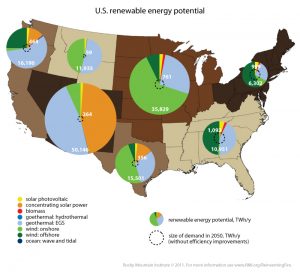
2. The primary problem is these regions are not were the core demand in the USA is located and we lack an energy distribution network. 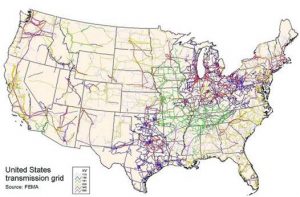
3. Inefficient distribution, production, and waste requires building multiple times demand capacity to meet peak demand. Because of the lack of solid storage systems, such as battery technology, inefficient distribution and production we need to overbuild to meet peak capacity if we rely sole on renewable. A thought process:
How to Get There !- 1 Quadrillion Btus per year = 2,739,730,000,000 BTUs/day
Solar (100 % Efficiency) – 433 Btu/hr per square foot
Available 24 hours per day
Need 6100 acres of Solar Panels
Wait – Solar-Assume Solar Efficiency Assume 10% (high) – Only Available about 8 hours per day
Need 182,000+ acres of Solar Panels, plus storage and duplicate capacity.
Wind- 25 % Conversion
Need about 270,000 10 MW Turbines, plus storage and duplicate capacity.
These analysis does not factor in transmission losses. If there was only a 10% loss and no other inefficiencies, we would multiple the calculated values by 1.1, but we have a use inefficiency of 58%. This means are multiplication factor is at least 1.9 to 2 +. So – 360,000 acres of solar panels and 540,000 10 MW turbines.
The goal for renewable should not be based on a Carbon or CO2 hammer and we must stop this myth of Man controlled climate. Climate on this Earth has not been constant, it is in dynamic equilibrium with Sun, Earth Process, and to a lesser extent life on Earth.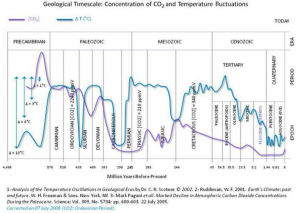
It is very likely man is having an influence on the climate, but this is not likely CO2 production but deforestation, building in the wrong places, heat island effects, and not adapting to our environment. As an alternative approach, we are suggesting the following:
- Fact based discussions about energy, economy, politics, and culture. We are humans so science (facts) and cultural discussions are linked, but we should not be using Fear as a rally cry.
- Concentration on energy waste reduction – individuals, homes, small business, and government.
- Distribution – We should focus on “hardening” the grid and creating capacity and duplicity were needed. We must start linking “renewable and other energy sources” and take advantage of the energy diversity in the USA.
- Storage – we must develop efficient storage technologies.
- The solution is not a CO2 hammer, electric cars, or a 100% renewable life cycle, but an all the above approach.
- Remember our beaches are moving, we live on a planet with the plates move and we have the Great Earth Engine. (Geothermal is a great asset for the USA).
- Energy and energy technology – we must not be hoarders, but exports of energy and energy technology and I do not mean low cost solar panels, but micro-grid energy systems that use multiple fuel stocks that can power rural villages and towns and not a Carbon Tax.
- If we cut our waste, we cut CO2 emissions. This makes the CO2 emissions benchmark useless and to be honest the arguments based on climate change and CO2 are weak.
- Stop the 100 % renewable myth (all the above approach).
I have never recommended a book to read – this is the first, but I strongly recommend “Scare Pollution“, 2016.
I also like “Human Caused Global Warming“, but I really wish the author hired and used an editor.
“Unsettled: What Climate Science Tells Us, What It Doesn’t, and Why It Matters”
I really enjoyed – “Global Warming-Alarmists, Skeptics and Deniers: A Geoscientist Looks at the Science of Climate Change“
Valley View Holds First High School Energy Fair Archbald Pennsylvania
“Northeastern Pennsylvania gas companies went to Valley View High School in Lackawanna County to sponsor an energy fair introducing youth to energy careers.
The growth and dedication that has been displayed between the natural gas industry and educational institutions over the years has been staggering. While much of that relationship has been amongst local area colleges, high schools have been becoming closely involved too, as evidenced by the Energy Education Program offered at Valley View High School in Archbald.”
As this blog has noted before, the Energy Education Program offered by Valley View is the first of its kind in the state, as it brings energy-specific curriculum to the high school level and was developed as a collaboration between industry experts and school officials. The course covers nine different types of energy and regularly features speakers from the various industries.
But on Friday, Dec. 18, Valley View took the next big step in its program and hosted its first Energy Fair, which was planned and organized by the Energy Education Program class.
Read More about the Event and Program
We were planning to go to the event, but the presenter became ill. Prior to the event, we did conduct training and educational course on energy conservation and Geothermal Energy.
Presentation on Sustainability Training (pdf)
Our Presentation on Careers in Energy – The Great Earth Engine (pdf)
More training Opportunities in Energy and the Environment
How you can help the Water Science Basics ! Trying to encourage a positive change in Pennsylvania.

